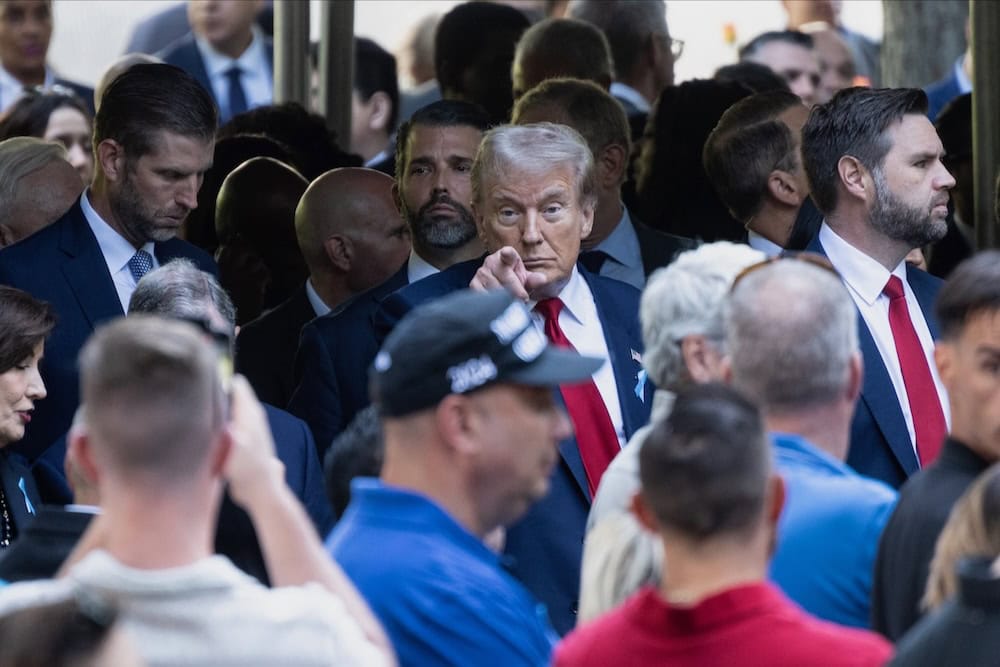Despite the alarming regularity of Trump’s anti-media diatribes, they seldom make the news anymore, much less headlines.
This statement was originally published on rsf.org on 25 October 2024.
As the U.S. presidential campaign reaches its November 5 climax, Republican candidate and former president Donald Trump has escalated his war on the free press, verbally attacking the media more than 100 times over the past two months. Yet these attacks rarely make the news anymore. Reporters Without Borders (RSF) is deeply concerned that American media – and in turn, the wider public – may be growing numb to the existential threat Trump’s attacks pose to American press freedom.
In an eight-week long period analyzed by RSF, Trump insulted, attacked, or threatened the media at least 108 times in public speeches or remarks from September 1 to October 24. This figure does not include social media posts or remarks from others connected to the campaign.
Early into a speech Trump delivered at a September 18 campaign rally in Uniondale, New York, he told his assembled crowd of supporters that he had a message to deliver to “the fake news media.” He then motioned to the back of the room where the press corps was assembled, saying “Look how many there are.” Many of the assembled supporters proceeded to loudly boo and jeer at the reporters. Similar moments of collective anger directed against the media present have become a near regular fixture of Trump’s rallies, to the point that they appear part of the scripted program.
Despite the alarming regularity of Trump’s anti-media diatribes, they seldom make the news anymore, much less headlines. During the period analyzed, RSF found only one instance of local news coverage of a Trump rally in October which mentioned him encouraging the crowd to denigrate the press. In one sense, Trump’s anti-media proclivities are well-known, but the sheer regularity and intensity of these attacks is now largely flying under the radar.
“Trump’s tirades against the press have become so commonplace that we risk not even noticing them anymore. But the regularity of Trump’s abuse only adds to the urgency to call them out. The dangers of growing numb to Trump’s attacks on the media cannot be overstated – what starts as a verbal insult can easily turn into something far more serious if left unchecked. RSF is deeply concerned that violent rhetoric can easily lead to violent actions.”
Clayton Weimers, Executive Director, RSF USA
Trump’s running mate, Senator JD Vance, has developed his own unique formula for stoking conflict between supporters and reporters on the campaign trail. Vance will often hold press conferences among his supporters as they loudly boo any reporter asking the vice presidential candidate a question.
The Trump campaign’s antipathy towards the media is not itself new. Trump has long dubbed any media that is critical of him “fake news,” using the term as many as 2,000 times during his presidency. However, his diatribes against the press have grown more threatening and increasingly encourage audience participation, potentially increasing the possibility of a violent confrontation between his political supporters and the media. Another alarming and novel aspect is Trump’s coupling of these verbal attacks with plans to weaponize the government against his perceived “enemies” in the news media.
Trump’s specific threats against the media
Trump has repeatedly issued specific threats to weaponize the U.S. government against the media when he is displeased with their coverage. He has made at least 15 calls for television stations to have their broadcast licenses revoked – a power the president does not possess. Following Democratic nominee Kamala Harris’s interview with the CBS program “60 Minutes,” Trump accused the show of manipulating Harris’s responses to appear more flattering and posted on his social media site Truth Social that “CBS should lose its license.” He later doubled down against CBS in an interview with Fox News, saying, “we’re going to subpoena their records.”
Trump called for ABC News to be punished after the network aired his singular debate with Harris. The former president has also said that Comcast – the parent company of NBC News and MSNBC – will be investigated for “treason” if he is elected.
After a draft Supreme Court decision on Roe v. Wade was released in May 2022, Trump said the journalists who broke the story should be jailed until they give up their sources.
Media trust at all time low
Trump’s attacks on the media are a contributing factor to a broader crisis of public distrust in the media. According to the Pew Research Center, trust in the media among Republicans has steadily declined since Donald Trump won the 2016 presidential election. In 2024, only 40% of Republicans “have a lot of or some trust in the information that comes from national news organizations.” This is roughly equal to the share of Republicans who say they have the same level of trust for information from social media sites, despite the very well publicized epidemic of misinformation on these networks.
A lack of trust in the media, a growing sense of insecurity among journalists, and outright hostility from politicians like Donald Trump are all factors contributing to the United States’ slide to 55th out of 180 countries on RSF’s 2024 World Press Freedom Index. In response to this backslide, RSF has urged both Donald Trump and Kamala Harris to adopt 10 policy proposals to strengthen American press freedom and reposition the United States as a global leader on the issue.



